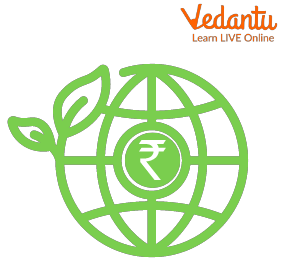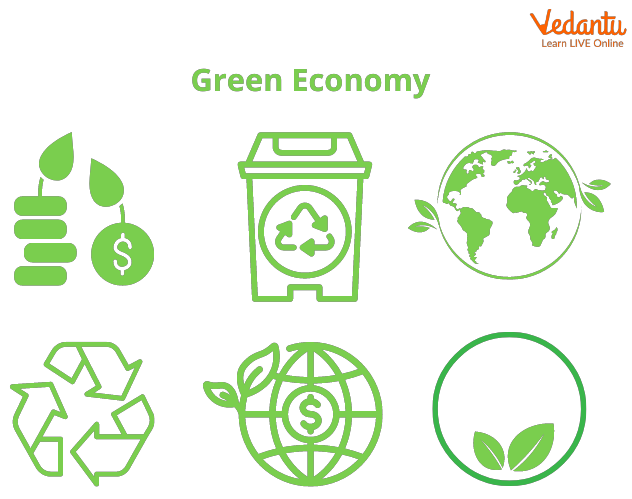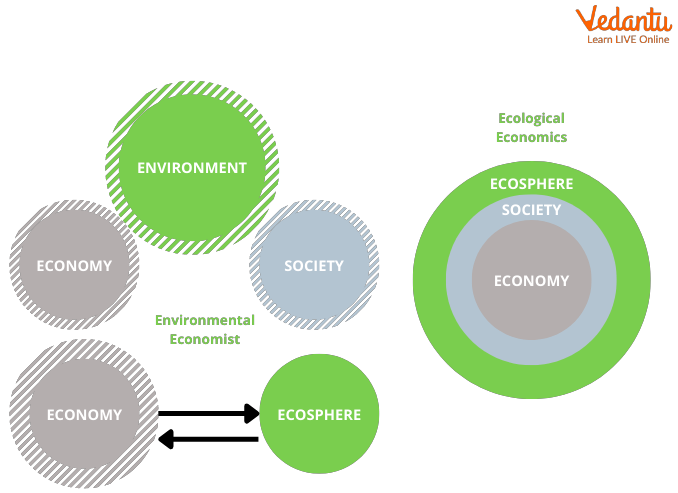




An Overview of the Green Economy
A field of economics called "green economics" aims to develop strategies that encourage peaceful relationships between people and the natural world. It covers various topics, including ways to interact with nature and production processes. Green economists may research the economics of alternative energy sources, materials, foods, or other industrial processes. Ecological and green economics are closely connected, but the latter differs in that the former takes a comprehensive approach and advocates for politically viable sustainable solutions.

Green Economy
Importance of a Green Economy
There are numerous ways to define a green economy. According to the International Chamber of Commerce's (ICC) 2011 report, "Ten Conditions for a Transition Toward a Green Economy," a green economy is one "where economic growth and environmental responsibility work together in a mutually reinforcing manner while supporting progress and social development." Green economics has become more widely accepted through consumer-facing labels that describe a company's or product's level of sustainability.

Green Economy Cycle
Green Economy Examples
Substantial expansion of the organic farming industry, construction of dwellings made of plants, and use of bicycles as a mode of transportation, and electric vehicles are prime examples of this, as their batteries may contain components that were extracted from war-torn areas and delicate rainforests.
Major Elements of Green Economy
Many organisations, from feminists to green anarchists, have appropriated the phrase "green economics." It broadly includes any theory that sees the economy as a part of the context in which it is based. A "low carbon, resource-efficient, and socially inclusive" economy meets the criteria set forth by the United Nations Environment Programme (UNEP).
As a result, green economists typically adopt a broad and all-encompassing perspective when comprehending and simulating economies, giving equal weight to the natural resources that support an economy and its operational principles.
Generally speaking, those who support this school of economics are worried about the state of the environment and think that steps should be taken to conserve the environment and promote harmonious coexistence between humans and nature. These economists support environmental protection by arguing that the environment is crucial to the economy and that the health of any successful economy is largely determined by the environment's health.
Green Economics vs Ecological Economics
Green economics and ecological economics are closely related in many aspects because both strongly emphasise sustainability and fairness while viewing natural resources as having quantifiable economic value.
Green economics proponents, however, are more politically oriented regarding putting these concepts into practice. Green economists support a cost accounting system in which the people or organisations (such as the government, businesses, or individuals) that damage or ignore natural resources are held accountable for their actions.

Green Economics vs Ecological Economics
Conclusion
A green economy can lead to sustainable growth. It can also aid in the abolition of poverty. However, each country experiences the transition to a green economy at a different pace. Resources, knowledge, and information are crucial for the shift to a greener economy.
FAQs on Green Economy: Definition and Importance
1. Which effects will the shift to a green economy have on the labour market?
The term "green economy" doesn't have a single definition. The concept's defining feature is the recognition of the economic importance of ecological services and natural capital and the necessity of protecting those resources.
Most definitions embrace sustainable development's more all-encompassing approach in addition to environmental considerations. Therefore, most definitions of the "green economy" include concepts like social justice, environmental sustainability, and locally-based production and exchange of goods and services.
A "green economy," according to the United Nations Environment Programme, is one that considerably reduces environmental dangers and ecological scarcities while also enhancing human well-being and social fairness. A green economy can be defined as one that is low-carbon, resource-efficient, and socially responsible.
2. How does the Green Jobs Programme encourage green employment on a national scale?
Constituents are becoming increasingly curious about green jobs, especially due to the high rates of underemployment and unemployment. They want to know if there are any fresh chances for economic development and job creation, and if so, how best to take advantage of them to broaden social inclusion and combat poverty. The Green Jobs Programme uses a variety of ways of action to encourage the creation of green jobs at the national, sub-national, and local levels:
Research on the potential for green employment development at the national and sectoral levels is based on the research's findings and policy recommendations to better integrate environmental and labour policies.
It would enable and strengthen social conversation, ensuring constituents' full participation in pertinent policy discussions and national strategies, and provide them with coaching if their capacity was built. Pilot programmes on green entrepreneurship, green business, vocational training, employment-intensive infrastructure, etc., at the sectoral and local levels.
3. How can Green Technology affect the economy?
The term "Green Revolution" describes a set of inventions that significantly improved agricultural productivity and efficiency worldwide. The world's population significantly rose, as a result, leading to increased pollution and resource consumption. The second Green Revolution wave affected large portions of the nation, which improved rural incomes, reduced rural poverty nationwide, and promoted India's economic growth. Through adapted practices like (1) expanding the amount of land used for farming, (2) double-cropping, (3) adopting HYV seeds, and (4) significantly expanding the use of inorganic fertilisers and pesticides, the green revolution increased crop productivity.
4. What causes Economics' Green Paradox?
The economist Hans Werner-Sinn initially proposed the controversial and paradoxical "green paradox" in 2007. According to it, any policy that aims to gradually cut back on the use of fossil fuels will have the unanticipated result of accelerating that use shortly. This is because fossil fuel firms will try to get more money out of fossil fuels now, knowing that they won't be able to get that money afterwards.























